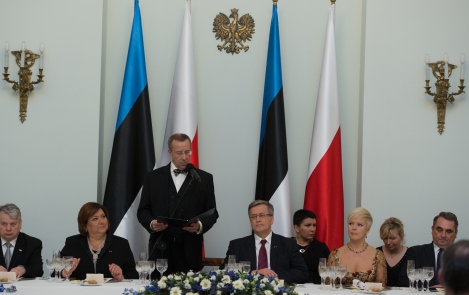-
Reset
+


President Toomas Hendrik Ilves at the State Dinner in Warsaw, 18 March 2014
18.03.2014
The Honorable President Bronisław Komorowski and Mrs. Anna Komorowska
Ladies and Gentlemen
Estonia and Poland are such close allies that, at first glance, a ceremonial state visit by the Estonian president seems to be an unnecessary reaffirmation of our friendship. So, I ask that these three days to be used for meaningful and idea-filled discussions on how to make the relations between Estonia and Poland in all various fields where we have such close relations, even closer.
Before World War II and since 1991, Estonia and Poland have been united primarily by security, by a desire to further integrate the Baltic Sea Area and make it more successful, as well as the wish to expand our mutual business contacts, and of course, to expand the area of peace, security and stability.
And since my dear friend Mr. President is a historian, let me look further back in history, we should pause at July 1, 1569 and the Lublin Union, when the Rzeczpospolita, Europe's largest state, the first democracy in Europe, also included the southern part of Estonia. British historian Norman Davies has called this union the precursor of the European Union.
More than four hundred years later, Czesław Miłosz wrote that Europe was divided into a superior and an inferior Europe, and stated candidly that they – that is, the European Union – actually do not want us, because "We come from a land that the world could survive without while proceeding along their path undisturbed."
Now, we – including Estonia and Poland – have seen that this is a false division of Europe. We have re-entered the Europe from which we were once physically expelled, but where we still remained intellectually and spiritually. And we will never leave this Europe again.
But there is more. As we look at how various countries have responded to the present crisis, when we look at how they have committed to fundamentally European values, and how they have committed, in blood and treasure, to the common values of Europe, I do not see that they have been as European as we. So who is it whom they can do without, and whom can they not do without?
Dear guests,
Thanks to the Rzeczpospolita, and Stefan Batory who was soon elected its king, and together with our friends in Sweden, Moscow's invasion of Livonia was halted. And in fact, one reason why we in Estonia today are part of Europe is for what was done by Stefan Batory. So tonight, here in Warsaw, let's think about this facet of history and think of the current events in Crimea.
Estonia and Poland both understand that this is not just a question of Crimea, of the relations between Ukraine and Russia. This is a geopolitical shift, which will change, at least for the near future, the entire European security picture and the dealings between the democratic European states and Russia.
Let us reject the question, "Are the Baltic states next?" I know the answer. We are not. Estonia, Latvia and Lithuania did the hard work, had the good sense and the good fortune to join NATO and the European Union – with the support of Poland.
Poland and the Baltic countries are not in the backyard of Europe. Nor is Crimea. There are no backyards in Europe. Therefore, we need to ask ourselves: what steps shall we now take with regard to Russia, which, with its armored vehicles and unmarked soldiers, has trampled over Ukraine's sovereignty and territorial integrity, over international law, over the UN Charter and fundamental documents of the OSCE and of course, over the key statements in the Russia-NATO founding pact.
Democratic Europe must abandon its current pragmatist gas-fueled relations with Moscow. How to accomplish this and what counter steps should be taken will continue to be the focus of our meetings here in Poland.
When shaping the policies of the European Union and NATO, we must not allow ourselves to be forced into silence and placidity based on the length of our membership in these organizations or the size of our populations.
When Polish President Ignacy Mościck made a state visit to Estonia in August of 1930, the newspaper Kaitse Kodu published the following statement by Juliusz Szymański, Marshal of the Sejm and honorary chairman of the Estonian-Polish Association, in a special issue devoted to Poland: "History does not recognize small and large nations; it only recognizes nations with small and large spirits. The size of the population is just a tool for strengthening character; in fact, history has demonstrated, this strengthening of character is often initiated by awareness of one's small numerical strength."
Estonia and Poland can contribute to the European Union's and NATO's decisiveness, to their strength and sense of responsibility in the defense of our common values and shape the necessary relations with those who have no regard for these values.
Estonia and Poland have proven their sense of responsibility. Among other things, by contributing two percent of GDP to our own, and therefore NATO's, defense capability. We also have a common understanding of modern security threats. Thus, Poland joined the NATO Cyber Defense Center in Tallinn already three years ago.
After all, our two nations know what Europe's indifference means, when secret deals and protocols rob people of their freedom, their independence, and their state. In The Captive Mind, Czesław Miłosz has written, "Eyes that have seen should not be shut; hands that have touched should not forget when they take up a pen."
Ladies and gentlemen,
Estonia and Poland have not closed their eyes. We have not forgotten. Our gazes are directed at creating a strong and successful Europe. And we are dedicated to shaping a common future. A future of liberty – something that we know what it means to lose.
I raise my glass to the health of our two nations, for your liberty and ours.




